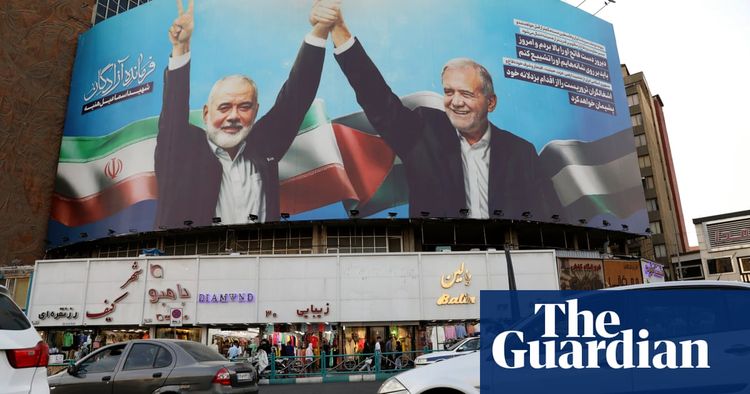Iran rejects western plea not to launch retaliatory attack against Israel

Iran has refused to heed the Western nations' pleas to refrain from seeking revenge on Israel for the assassination of Ismail Haniyeh, the Hamas political leader, which took place in Tehran at the end of last month.
Iran's foreign ministry spokesperson, Nasser Kanani, stated that the requests are illogical from a political standpoint and go against the principles and regulations of international law. He also described them as an unreasonable demand.
In a recent report from the IRNA news agency, President Masoud Pezeshkian expressed his concerns during a phone call with British Prime Minister Keir Starmer. He criticized the lack of action from the west regarding the "unprecedented inhumane crime" happening in Gaza and Israeli attacks in other parts of the Middle East. President Pezeshkian called this silence "irresponsible" and warned that it could jeopardize regional and global security.
Iran and its friends have accused Israel of being responsible for the death of Haniyeh on July 31st while in Iran for Pezeshkian’s inauguration as president. A short time before, Israel had conducted a strike in Beirut that killed a high-ranking commander of Hezbollah, a strong militant group in Lebanon that is supported by Iran. Israel has not publicly responded to the accusations of being involved in Haniyeh’s death.
Western diplomats are working quickly to avoid a big conflict in the Middle East, where tensions are already high because of the fighting between Israel and Hamas in Gaza.
The White House issued a warning about the potential for major attacks from Iran and its allies in the coming week. In response, they have deployed fighter jets, anti-missile warships, and a guided missile submarine to support Israel in the region.
Experts predict Iran will likely retaliate against the Israeli attacks, but they will try to prevent a full-scale war from breaking out.
In April, just two weeks after an attack on Tehran's embassy in Syria resulted in the deaths of two Iranian generals, Iran sent a large number of drones, cruise missiles, and ballistic missiles towards Israel. This attack caused damage to two airbases, but the majority of the weapons were successfully intercepted before they could reach their intended destinations.
"Iran aims to make sure its retaliation is more impactful than the attack on April 13," stated Farzin Nadimi, a senior fellow at the Washington Institute for Near East policy.
Iran could choose to depend on its allies in Lebanon, Iraq, Yemen, and Gaza. However, apart from Hezbollah, the different groups in Tehran's "axis of resistance" might not have the capacity to cause significant harm to Israel.
Hamas launched two missiles from Gaza towards Tel Aviv, the main business center of Israel, on Tuesday after not doing so for a while. Fortunately, no one was hurt when one missile landed in the sea and the other hit Israeli land, according to the Israeli army.
When questioned on Tuesday about whether he believed Iran would choose not to launch a counterattack if a ceasefire was achieved in Gaza, Joe Biden responded, "That's what I anticipate."
A new set of discussions to stop fighting is set to start on Thursday, but it's unlikely that an agreement will be reached. There are doubts from Hamas officials about attending the talks and whether they will actually take place.
Extreme right-wing parties in Israeli Prime Minister Benjamin Netanyahu's governing coalition are vehemently against any cease-fire in Gaza.
Itamar Ben-Gvir, a nationalist minister, broke long-standing rules by leading hundreds of Israelis in singing Jewish songs and practicing religious customs at the elevated area in Jerusalem's Old City, which is also sacred to Muslims.
According to the current agreement, which is delicate and has been in place for a long time, Jews are allowed to visit the location but are not permitted to pray there. This area is considered the third most sacred site in Islam and the most sacred site for Jews, who refer to it as the Temple Mount.
The intentionally controversial action seemed to be intended to interrupt upcoming discussions. In a recorded video from inside the area, Ben-Gvir reiterated his resistance to any halt in the Gaza conflict. "We need to secure a victory and not attend the discussions in Doha or Cairo," stated the minister.
Netanyahu's team stated that Ben-Gvir's visit to the Temple Mount went against the usual practice, but Israel's stance on the matter has not changed.
The increasing risk of a broader conflict with Iran and its allies is happening while Israel is still attacking Gaza. Officials from the health department in Gaza, which is controlled by Hamas, have reported that nearly 40,000 Palestinians have died since the fighting started in October.
The conflict started when Hamas unexpectedly attacked villages in southern Israel, resulting in the deaths of 1,200 individuals, the majority of whom were civilians. Additionally, militants took 251 people hostage, with 111 still being held in captivity in Gaza. The Israeli military reports that 39 of these hostages have died.
There is increasing demand for a truce in Gaza after medical services in the Hamas-controlled area reported that an Israeli airstrike on a school where displaced Palestinians were staying resulted in the death of 93 people. Israel claims they were targeting militants using the school and mosque as a base.













































